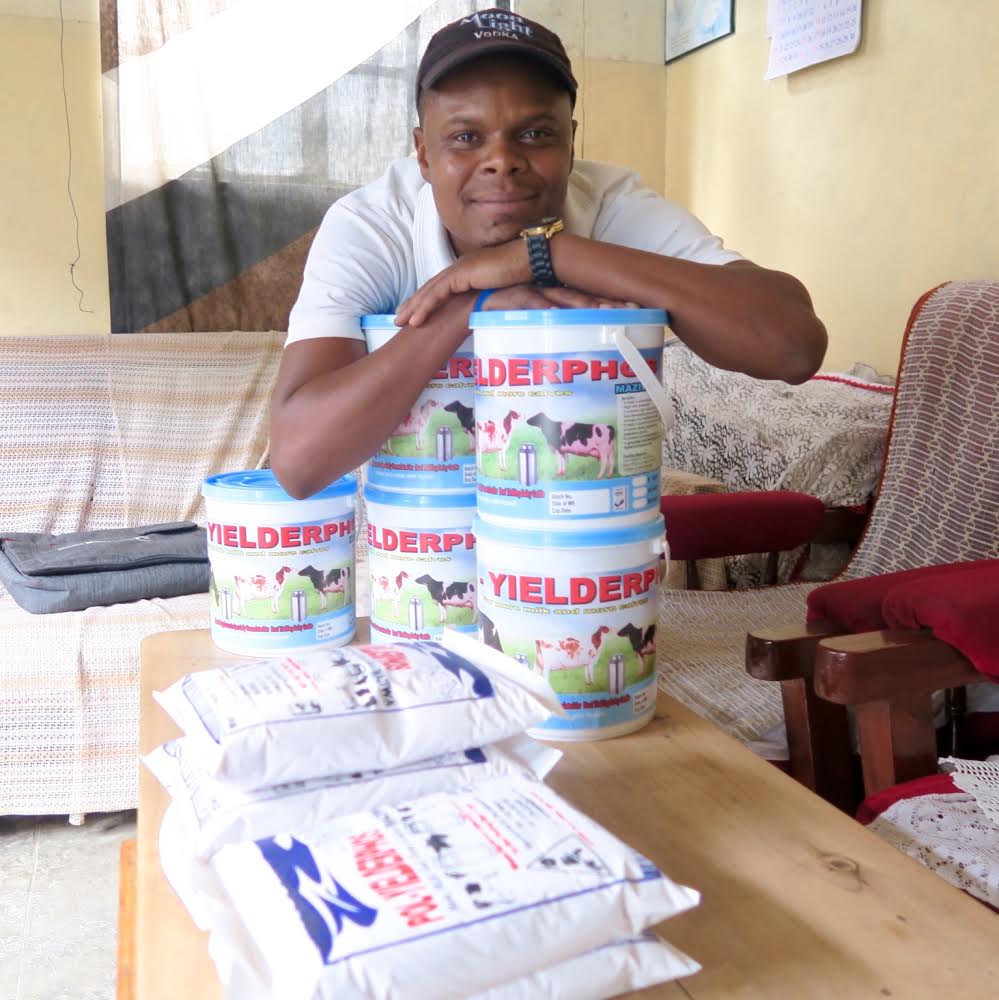A former casual worker is now earning at least Sh30,000 monthly in profits after quitting his job to start his own company that manufactures mineral supplement feeds.
In 2014, Apollo Kariuki grew frustrated working as a casual laborer at Nakuru General Hospital. His frustration pushed him to resign to venture into making mineral supplements for dairy farmers, a venture that is now earning him three times more income in a month.
With an initial capital of Sh130,000 drawn from his savings and a loan from Citi bank, Kariuki started an enterprise called Pol-yielderphos which specializes in making animal feeds rich in calcium, phosphorus, iron, copper and vitamins, essential for enhancing milk production and maintaining the nutrition of cows, sheep and goats.
Related
Sweet potato vines and roots silage offers livestock more proteins
Magic Protein for increased Milk Yields
Cockroach milk could be the protein ingredient you have been missing

Apollo Kariuki. Photo: FarmBiz Africa
“The mineral supplements we produce help farmers improve milk production by up to two liters in a day and also boosts the weight of animals used for beef,” said Kariuki.
Initially, Kariuki used his home to produce the animal feeds from lime and salt due to limited funds but as his enterprise expanded he has now rented a workshop in Nakuru town.
Kariuki produces more than one tonne of mineral supplements in a month currently up from 500kg when he first started the business.
“We package our products in 2kg, 5kg, 10kg and 20kg packets with each kilo retailing at Sh100,” said Kariuki.
He sources packaging materials from the capital city, Nairobi with a two kilogram package costing him Sh15 per piece.
The businessman has employed three casuals who work hand in hand with him to produce and sell the feeds.
His customer base is mainly farmers across the Rift Valley region in towns and rural areas such as Molo, Oljororok, Eldoret and Molo amongst other areas.
On a good day, Kariuki earns Sh1000 in profits translating to Sh30,000 in a month.
There are two challenges that Apollo is struggling with.
His customer base is scattered across rural areas of the Rift Valley, transport thus is a huge task and a considerable cost. He currently either uses matatus (public buses) or hires a car. The opportunity of solving this issue is sizeable. He recently had to turn down an order for 4 tonnes worth Sh400,000 because he could not move that volume.
Besides, customers do not provide down payments; he struggles to produce large orders. So, increased inventory of raw materials is critical if he is to grow his business, through completing larger orders.
Statistics from the Kenya Dairy Board indicate that milk production has increased by 26 per cent over the past three months buoyed by the ongoing rains that have led to increase in pasture.
The Kenya Dairy Board reports that the volume of milk produced has gone up from 47.9m kilograms recorded in January this year to 60.2m kilograms in March with the amount expected to increase further.
In a similar period last year, milk production dropped by 17.5 per cent compared to 2016.
A report by the Kenya National Bureau of Statistics indicates 215.9m liters were sold to processors between January and May compared to 261.9m liters in a similar period in 2016.
















Comments powered by CComment